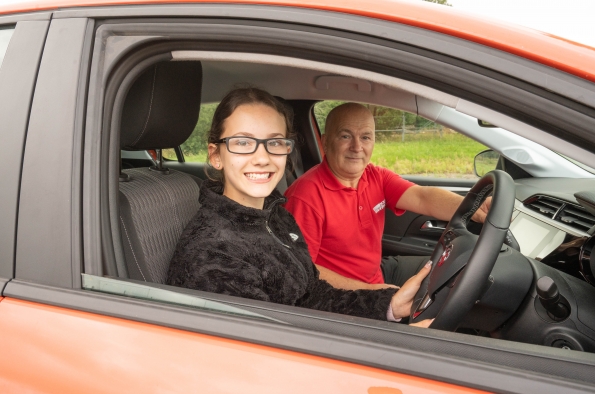- As waiting lists for driving lessons grow, teen expert Nicola Morgan gives advice to parents if they’re taking youngsters out for additional practise
- Driving instructors have on average 10 teens on their waiting lists
- New virtual driving lessons can supplement practical tuition to help improve learning
As driving lessons have been unable to take place for much of the past year, hundreds of thousands of teens have had their learning to drive journey put on hold.
A survey of 150 driving instructors by the UK’s largest pre-17 driving school, Young Driver, revealed that getting lessons booked in now restrictions are lifted may not be that easy. Eight out of 10 instructors said they had a waiting list of, on average, 10 learners they can’t currently fit in the diary. Half (47 per cent) said they would struggle to provide as many lessons as learners wanted and one in three (36 per cent) said learners who haven’t started learning yet may have to wait months for their first lesson.
That means it is likely that more learning will have to be done away from professional tuition – falling to parents and technology to fill the gaps. Sue Waterfield, head of marketing at Young Driver, said: “We could see this was going to be a big problem post-lockdown, so we wanted to do something to help. We have created and launched the first set of 360° virtual driving lessons, accessible via an app. These can be invaluable for learners looking to keep their skills fresh in between lessons – and for parents who might want to make sure they’re teaching the right way when they take youngsters out to practice.”
The Young Driver App takes learners from first lesson to driving test, providing lesson practice via 360° videos which can be watched on a smartphone or VR headset. The videos, which are rotatable so they can be seen from every angle, are filmed with Approved Driving Instructors, with a voiceover written and narrated by driver’s champion Quentin Willson. The videos cover everything from tackling junctions and roundabouts to manoeuvres such as parking or reversing. This is alongside theory test practice modules, hazard perception videos and top tips – everything needed to complement in car tuition.
Sue Waterfield continues: “Of course in car practice is the key, but if there’s a way to reinforce those skills at home using technology, it makes sense to do that. Parents can also help by taking youngsters out to practice – but our research shows that only a third of parents (33 per cent*) would feel confident teaching their child to drive, even alongside professional tuition.”
Young Driver has worked with teen expert, award-winning author and international speaker Nicola Morgan, to pull together some advice to help parents cultivate their learner driver’s confidence:
- Show you trust your child with responsibility. Showing you trust them behind the wheel of your car is a confidence boost in its own right, especially in a world where we are so often not allowed to take ‘risks’ because of safety concerns.
- Offer genuine and specific praise – but only for something they really did. Saying “You did really well” when they didn’t will not help as they’ll see through it. Young people almost always need the approval of their significant adults, even if they may not say so! Pinpoint specific things they did well or any good questions they ask.
- Praise effort not talent. You might think that saying “You’re really good at this” would be confidence-boosting but comparing them against other people will engender competition. Also, the positive feeling wears off as they start to think they are good at it by luck – they lose ownership. “Well done – you listened really well/ worked really hard/ really got the hang of that” all work better as motivators.
- Speak to them like an adult. Although you don’t have to be all matey and fun and jokey! You know driving is serious and you want them to think it’s serious, too.
- Listen to them when they express an emotion, fear or worry. Validate it: “Lots of people worry about that”, “I used to worry about that,” “It’s actually good that you’re nervous about that because it means you’ll concentrate”. Never dismiss it.
- Emphasise that everyone has good and bad days. If they are tired or stressed encourage them to leave their worries at the door and treat the driving lesson as a positive, energising experience. Driving is an activity which occupies enough of their concentration that they cannot simultaneously be dwelling on whatever other worries they have.
- Help them realise that struggling with something is still helping them learn. Praise them for keeping trying even when they were struggling. It all helps – in fact during overnight sleep, we improve the physical skills practised during the day.
- Practice makes perfect – even if it’s on the screen. There’s a theory that mirror neurons in our brain fire when we watch someone do something and that this may help us later perform that action ourselves. So, watching a driving instructor perform an action in a 360° video might well improve speed and efficacy of acquiring driving expertise.
Young Driver is the UK’s largest provide of driving lessons for 10-17 year olds and has delivered over 900,000 lessons at 70 private venues across the UK. For more information go to www.youngdriver.com or to download the app search ‘Young Driver App’ on Google Play or the App Store.
Nicola Morgan is an internationally-acclaimed author and authority on teenage wellbeing often referred to as ‘The Teenage Brain Woman’. Her books include Blame My Brain, which was shortlisted for the Aventis Prize, the Teenage Guide to Stress, Teenage Guide to Friends, Positively Teenage, Life Online, Body Brilliant, The Awesome Power of Sleep and Be Resilient.


















